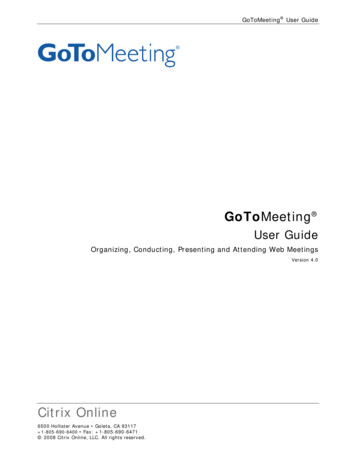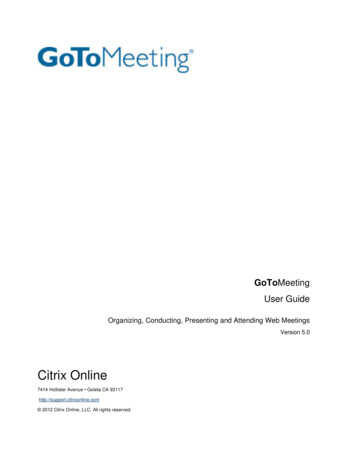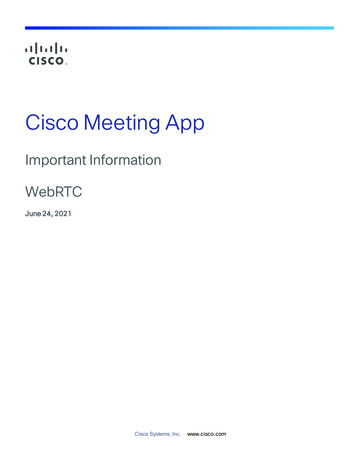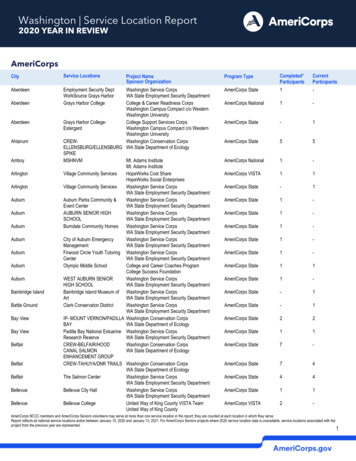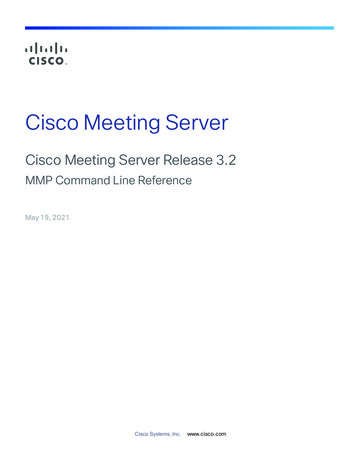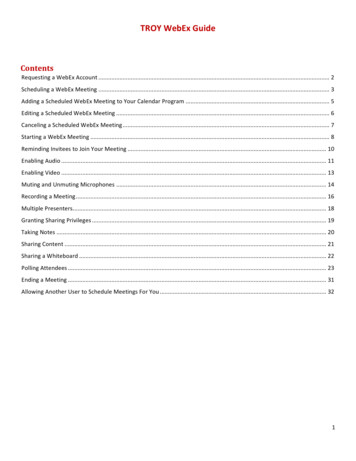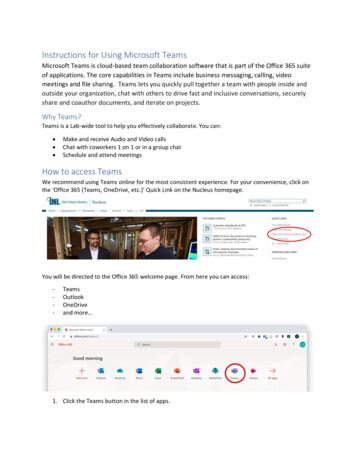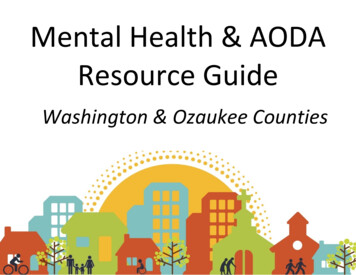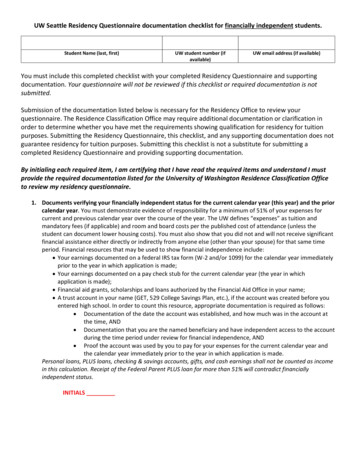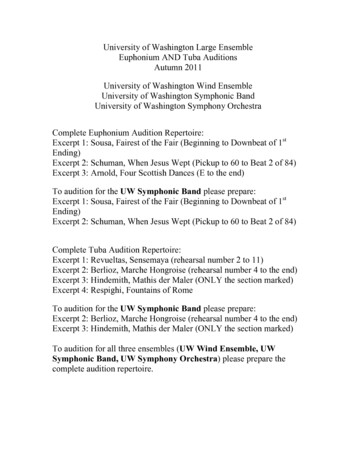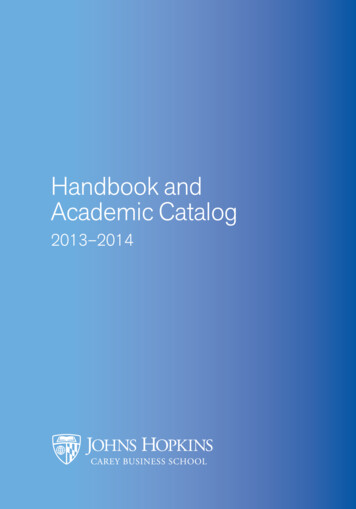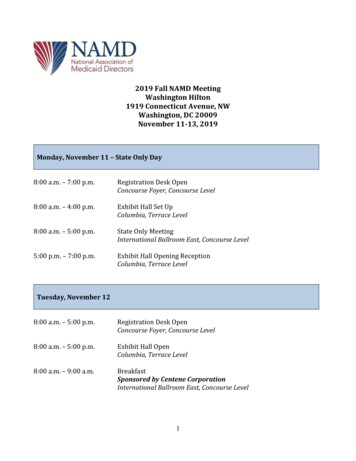
Transcription
2019 Fall NAMD MeetingWashington Hilton1919 Connecticut Avenue, NWWashington, DC 20009November 11-13, 2019Monday, November 11 – State Only Day8:00 a.m. – 7:00 p.m.Registration Desk OpenConcourse Foyer, Concourse Level8:00 a.m. – 4:00 p.m.Exhibit Hall Set UpColumbia, Terrace Level8:00 a.m. – 5:00 p.m.State Only MeetingInternational Ballroom East, Concourse Level5:00 p.m. – 7:00 p.m.Exhibit Hall Opening ReceptionColumbia, Terrace LevelTuesday, November 128:00 a.m. – 5:00 p.m.Registration Desk OpenConcourse Foyer, Concourse Level8:00 a.m. – 5:00 p.m.Exhibit Hall OpenColumbia, Terrace Level8:00 a.m. – 9:00 a.m.BreakfastSponsored by Centene CorporationInternational Ballroom East, Concourse Level1
9:00 a.m. – 9:15 a.m.Welcome and Opening RemarksInternational Ballroom, Concourse LevelOn behalf of the organization, Matt Salo, Executive Director of NAMD,will welcome participants to Washington, DC and NAMD’s 2019 Fallmeeting. Matt Salo will introduce Administrator Verma.Speaker: Matt Salo, Executive Director, NAMD9:15 a.m. – 9:45 a.m.Plenary Session: The Administration’s Vision for MedicaidInternational Ballroom, Concourse LevelSpeaker: Seema Verma, Administrator, Center for Medicare and MedicaidServices (CMS)9:45 a.m. – 10:00 a.m.Remarks from NAMD’s Board President and President-ElectInternational Ballroom, Concourse LevelSpeakers: Kate McEvoy, Director, Division of Health Services, ConnecticutDepartment of Social Services; President, NAMD Board ofDirectors Beth Kidder, Deputy Secretary for Medicaid, Florida Agency forHealthcare Administration; President-Elect, NAMD Board ofDirectorsKate McEvoy, Medicaid Director in Connecticut and the President ofNAMD’s Board of Directors, and Beth Kidder, Medicaid Director inFlorida and President-Elect of NAMD’s Board, will welcomeattendees to the meeting. They will provide an overview of theconference and how they advance the Medicaid Directors’ values andpriorities.10:00 a.m. – 11:15 a.m.Plenary Session: Moving Forward Despite Federal Constraints:Practical Solutions to Barriers to Advancement of SocialDeterminants of Health (SDOH)International Ballroom, Concourse LevelCommon barriers to advancing progress in SDOH include routinedata exchange, interoperability and financing across siloed sectors2
such as health care, housing, food, and public safety. While HHSconsiders steps it could take to eliminate federal barriers, states aremoving forward in practical ways at the state and local levels tomake cross-sector data interoperable, to make data matchingroutine, to braid funding, to align budgets, and to clarify swim lanes.Public and private sector leaders from three states will share stepsstates can take now to advance SDOH.Moderator: Kate McEvoy, Director, Division of Health Services,Connecticut Department of Social Services; President, NAMD Boardof DirectorsPanelists: Elizabeth daCosta, Senior Director of Housing and CommunityIntegration, Community Bridges MaryAnne Lindeblad, Director, Washington Health CareAuthority David Mancuso, PhD, Health Economist, Washington StateDepartment of Social and Health Services Jami Snyder, Director, Arizona Health Care Cost ContainmentSystem11:15 a.m. – 11:45 a.m.Networking Break in the Exhibit HallSponsored by PhRMAColumbia, Terrace Level11:45 a.m. – 1:00 p.m.CONCURRENT BREAKOUTSBreakout 1Advancing the Partnership between Medicaid and PrimaryCare Associations: Learning From Leading StatesInternational Ballroom West, Concourse LevelMedicaid Directors and PCA CEOs from Hawai’i and Idaho willdescribe how they are collaborating to improve health outcomes,member and provider experiences, and reduce total cost of care.Moderator: Dianne Hasselman, Deputy Executive Director, NAMDPanelists: Robert Hirokawa, Chief Executive Office, Hawai’i PrimaryCare Association Yvonne Ketchum-Ward, Chief Executive Officer, IdahoPrimary Care Association3
Breakout 2Judy Mohr Peterson, Administrator, Med-QUEST Division,Hawai’i Department of Human ServicesMatt Wimmer, Division Administrator for Medicaid, IdahoDepartment of Health and WelfareValue-based Purchasing Strategies to Address PharmacyCosts: What Are Medicaid Directors Learning?International Ballroom East, Concourse LevelManaging the growing costs of the Medicaid pharmacy benefit andensuring its value are perennial priorities for Medicaid Directors.In this session, attendees will learn how Medicaid programs areinnovating and optimizing the pharmacy benefit, covering topicssuch as relationships with pharmacy benefit managers (PBMs),population-based payment strategies for specific diseaseconditions, and how to manage specialized therapies.Moderator: Rachel Nuzum, Vice President, The CommonwealthFundPanelists: Jennifer Babcock, Vice President for Medicaid Policy,Association for Community Affiliated Plans MaryAnne Lindeblad, Director, Washington Health CareAuthority Carol Steckel, Commissioner, Department for MedicaidServices, Kentucky Cabinet for Health and Family ServicesBreakout 3Strengthening the Relationship between Tribes and Medicaid:What Are We Learning About What Works?Lincoln East, Concourse LevelAs a primary source of health care for American Indians andAlaska Natives, Medicaid programs face unique complexities inthis role. This session will feature Medicaid-tribal partnerships atthe state and federal levels and the effective strategies used in avariety of these complex areas including, but not limited to:managed care, communications and tribal consultation, andtelehealth.Moderator: Tom Betlach, Partner, Speire Health ConsultingPanelists: W. Ron Allen, Jamestown S’Klallam Tribe, and Chair of CMSTechnical Advisory Group4
Breakout 4Melody Anthony, Medicaid Director, Oklahoma Health CareAuthorityMelanie Fourkiller, Choctaw NationKitty Marx, Director, CMCS Division of Tribal AffairsRussel Toal, Deputy Director, New Mexico Human ServicesDepartmentMedicaid’s Role in Empowering Individuals with Intellectualand Developmental DisabilitiesGeorgetown, Concourse LevelFor some Medicaid covered populations, the program does morethan provide health care services – it helps create the conditionsto lead independent, dignified lives. In this session, attendees willhear from both state officials and Medicaid members on how theprogram lifts up and supports individuals with intellectual anddevelopmental disabilities.Moderator: Mike Nardone, Medicaid Policy ConsultantPanelists: William Jordan, Tennessee Patti Killingsworth, Assistant Commissioner, Chief of LongTerm Services and Supports, TennCare Jordan Scheff, Commissioner, Department ofDevelopmental Services, Connecticut Varian Salters, Self Advocate Coordinator, Department ofDevelopmental Services, Connecticut1:00 p.m. – 2:00 p.m.Plated Networking LunchSponsored by Aetna MedicaidInternational Ballroom, Concourse Level2:00 p.m. – 3:15 p.m.PLENARY: Getting to Know Your Medicaid Director – Strategiesfor Creating Strong PartnershipsThis session will identify strategies for how outside stakeholders –including managed care plans, other vendors, and advocates – whopartner with Medicaid agencies can do so more effectively. It willexplore how the relationship between Medicaid agencies andoutside stakeholders can be strengthened to meet the strategicvision of the Medicaid program; how to operationalize that vision toimprove outcomes for members and ensure the sustainability of the5
Medicaid program; and how external stakeholders and Medicaid candefine a relationship along the continuum of collaborator toregulator, among other topics.Moderator: Gretchen Hammer, NAMD Senior Strategic AdvisorPanelists: Cindy Beane, Commissioner, West Virginia Department ofHealth and Human Services Stephanie Muth, Associate Commissioner, Medicaid/CHIPDivision, Texas Health and Human Services Commission Dan Tsai, Assistant Secretary, MassHealth, MassachusettsDepartment of Health and Human Services3:15 p.m. – 3:45 p.m.Networking Break in Exhibit HallSponsored by DentaQuestColumbia, Terrace Level3:45 p.m. – 5:00 p.m.CONCURRENT BREAKOUTSBreakout 1Medicaid Engagement in School-Based ReadinessGeorgetown, Concourse LevelMedicaid agencies play a critical role in supporting kids withschool-based readiness. This session will start with a nationaloverview of Kids Count data from Annie E. Casey, and what weknow about children living in poverty. Then three states willshare their approach to leveraging Medicaid to advance schoolreadiness, from evidence-based fundamental strategies to moreinnovative approaches, including a first-in-the-nation effort todevelop a measure to hold plans accountable for schoolreadiness.Moderator: Gretchen Hammer, NAMD Senior Strategic AdvisorPanelists: Lori Coyner, Medicaid Director, Oregon Health Authority Douglas Fish, MD, Medical Director, New York Departmentof Health Karina Jimenez Lewis, Senior Policy Associate, Annie E.Casey6
Breakout 2Promising Solutions for Improving Maternal and InfantMortality and Morbidity RatesInternational Ballroom East, Concourse LevelThe maternal mortality rate in the US has increased since 2000with the burden falling disproportionately on women of color.This panel will identify promising policy levels available to statesand how Medicaid Directors are responding to this crisis to helpensure that women and infants get the care they need.Moderator: Pooja Mehta, MD, Cityblock HealthPanelists: Maureen Corcoran, Director, Ohio Department of Medicaid Ronsha Dickerson, Southern New Jersey PerinatalCooperative Jennifer Jacobs, Director, Division of Medical Assistanceand Health Services, New Jersey Department of HumanServices Cheryl Roberts, Deputy Director of Programs, VirginiaDepartment of Medical Assistance ServicesBreakout 3Medicaid Strategies to Manage AddictionInternational Ballroom West, Concourse LevelThis session will identify strategies for how state Medicaidprograms are managing addiction to a variety of substances. Itwill explore how states are facing these complex challenges, bothon the education and prevention side, and on the treatment side.Moderator: Ben Miller, Chief Strategic Officer, Well Being TrustPanelists: Tracy Johnson, Medicaid Director, Colorado Department ofHealth Care Policy and Financing David Kelley, MD, Chief Medical Officer, PennsylvaniaDepartment of Human Services Judy Mohr Peterson, Administrator, Med-QUEST Division,Hawai’i Department of Social ServicesBreakout 4Satisfying Solutions for Non-Emergency MedicalTransportation (NEMT)Lincoln East, Concourse LevelFor many reasons, NEMT has persistently been a highlychallenging operational aspect of any Medicaid program. In this7
session, Medicaid Directors from Arizona, DC and Michigan willdiscuss new strategies they are using to address NEMT and willshare their approaches and learnings to date.Moderator: Leesa Allen, Deputy Secretary, PennsylvaniaDepartment of Public WelfarePanelists: Shelli Silver, Deputy Director, Health Plan Operations,Arizona Health Care Cost Containment Systems Melisa Byrd, Senior Deputy Director/Medicaid Director,D.C. Department of Health Care Finance Mark Larson, Senior Vice President, Leadership andCapacity Building, Center for Health Care Strategies Kate Massey, Medicaid Director, Michigan5:15 p.m. – 7:00 p.m.Evening ReceptionSponsored by Anthem, Inc.International Ballroom, Concourse LevelWednesday, November 138:00 a.m. – 1:00 p.m.Registration Desk OpenConcourse Foyer, Concourse Level8:00 a.m. – 11:00 a.m.Exhibit Hall OpenColumbia, Terrace Level8:00 a.m. – 9:00 a.m.Medicaid Directors-Only Breakfast with AlumniCabinet, Concourse Level8:00 a.m. – 9:00 a.m.Networking BreakfastSponsored by Blue Cross and Blue Shield of IL, NM, MT, OK and TXInternational Ballroom East, Concourse Level9:00 a.m. – 10:15 a.m.PLENARY: Demographics and the Destiny of the Nation’s CareSystems for Older AmericansInternational Ballroom, Concourse LevelThe demographic trends are clear: America is aging, with Censusprojections predicting seniors will outnumber youth under 18 by2035. What does this mean for the nation’s long-term services and8
supports systems, and what may need to change? What is the role ofthe states and the federal government in addressing the needs of arapidly growing senior demographic with diverse care needs? Theseare the big-picture questions that this plenary will explore.Moderator: Kate McEvoy, Director, Division of Health Services,Connecticut Department of Social Services; President, NAMD Boardof DirectorsPanelists: Jeanne Abadie, LTSS Advocate, Louisiana AARP Volunteer Katherine Hayes, Director of Health Policy, Bipartisan PolicyCenter Jeanne Lambrew, Commissioner of Health and HumanServices, State of Maine Chris Traylor, Former Director, Center for Medicaid and CHIPServices10:15 a.m.– 10:45 a.m.Networking Break in Exhibit HallColumbia, Terrace Level10:45 a.m.– 11:45 a.m.CONCURRENT BREAKOUTSBreakout 1What Do States Really Want from 1115 Waivers?International West, Concourse LevelSection 1115 waivers are a well-known pathway for Medicaidprograms to test new ideas and drive innovation, and in somecases, serve as the foundation for the entire state’s program. In anera of state flexibility, there’s increasing interest, as well asincreasing scrutiny, of this pathway. Participants will hear fromthree Medicaid Directors about their vision for the future ofSection 1115 waivers, including opportunities to drive innovationand how to preserve the success of longstanding 1115s.Moderator: Robin Rudowitz, Associate Director, Program onMedicaid and the Uninsured, Kaiser Family FoundationPanelists: Gabe Roberts, Director, TennCare, and DeputyCommissioner, Tennessee Department of Finance andAdministration9
Breakout 2Patrick Tigue, Medicaid Director, Rhode Island ExecutiveOffice of Health and Human ServicesMatt Wimmer, Division Administrator for Medicaid, IdahoDepartment of WelfareCongressional Perspectives on MedicaidInternational East, Concourse LevelJoin professional staff from the House Energy and CommerceCommittee and the Senate Finance Committee for a free-rangingdiscussion of Medicaid issues.Moderator: Catherine Finley, Partner, Thorn Run PartnersPanelists: Anne Dwyer, Senior Health Counsel, Senate FinanceCommittee Caleb Graff, Professional Staff, House Energy andCommerce Committee Stuart Portman, Health Policy Advisor, Senate FinanceCommittee Rick Van Buren, Health Counsel, House Energy andCommerce CommitteeBreakout 3Medicaid as an Economic Pathway to MobilityGeorgetown, Concourse LevelRecognizing Medicaid’s role as a coverage provider to the nation’smost financially disadvantaged populations, states are pursuing arange of strategies to improve the economic mobility of Medicaidbeneficiaries. These strategies include referrals and linkages toeducation, employment, and training supports, communityengagement requirements, and pathways for certain individuals tomaintain eligibility even as their earnings increase. This sessionwill cover how states have leveraged these and other strategies tosupport economic mobility for Medicaid populations. Moderator: Allison Taylor, Director of Medicaid, IndianaFamily and Social Services AdministrationPanelists: Yvette Chocolaad, Policy Director, NASWA Kate Massey, Medicaid Director, Michigan Department ofCommunity Health10
11:45 a.m. – 12:45 p.m.Marie Matthews, Medicaid Director, Montana Departmentof Public Health and Human ServicesBobbi Stammers, RN, MontanaLunch and Closing Plenary SessionInsights from CMCSInternational Ballroom, Concourse LevelSpeaker: Calder Lynch, Acting Deputy Administrator and Acting Director,Center for Medicaid and CHIP Services12:45 p.m.CLOSING REMARKSInternational Ballroom, Concourse LevelSpeaker: Matt Salo, Executive Director, NAMD11
1 2019 Fall NAMD Meeting Washington Hilton 1919 Connecticut Avenue, NW Washington, DC 20009 November 11-13, 2019 Monday, November 11 – St
